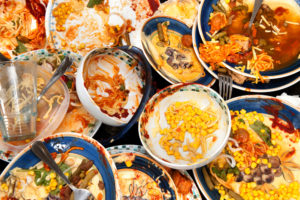Composting has long been the most environmentally friendly alternative to throwing things out. It is not only sustainable and widely practiced, but it is also a bylaw in the majority of the Lower Mainland.
Composting may seem like an extra effort, but there are actually ways that it can benefit you as well as your environment. Save your drains and garburator by composting instead!
If you do not compost, or you notice that large amounts of food get washed down the sink, you could create a bigger problem in your plumbing. Look out for the signs of a clog.
1. Organic Material Clogs Drains
The main way that composting can help you avoid clogged drains is by keeping old food from gathering in your sink. Leftover organic materials can cause clogs.
Larger organic materials can not only clog your drains, but they can also break your garburator. If you overload your garburator with too much debris, it can break easily. It is best to compost as much material as you can before you use the garburator if you have one.
Over time, if this debris isn’t cleaned out or cleared away, it can collect in the pipes beneath your sink and cause slow drainage, or stop drainage altogether. Be especially careful with smaller items, such as coffee grinds or food in soup broth.
2. Compost Old Food Before Washing Dishes
If you do not have a dishwasher, it is very common to wash your dishes in the kitchen sink. Be sure to clean
Old food can sink to the bottom and drain out with the dirty water. This can lead to potential clogs when the old food gathers in your pipes.
Composting is not only mandatory in the lower mainland, it is helpful for your home. In addition, use environmentally friendly dish soap. It is easier on your skin, as well as your drains. It ensures that the water leaving your home isn’t filled with harsh chemicals.
3. Keep A Filter In Your Sink
When you use your sink to wash food or clean dishes, keep the grate up over the top of the drain. This will help to strain any debris that ends up gathering at the bottom and keep it from going down the drain and into your pipes. A filter in your sink works like a pasta strainer.
Water passes through freely and anything larger than the grate gets caught. This prevents debris from entering your pipes and makes it easy for you to compost the food that gets stuck.
Once you drain your sink after washing dishes, be sure to collect any food that has collected in the grate as well.
4. Buy A Composting Bin And Grease Container
A composting bin is the most efficient way to dispose of the organic material. You can also use biodegradable garbage bags for your composting. To avoid any potential messes when you empty the composting bin.
In addition to composting the organic matter, you should store any excess grease from cooking in a similar container.
When grease gets poured into a sink it is in a liquid form, but as it sits in your pipes it hardens and can slowly restrict the flow of water in your drainage system.
Not to mention it is not a very environmentally friendly substance. It is a good practice to keep a small container at home next to the sink so that you can pour the excess from cooking into it before washing.
5. Call Your Plumber And Ask About Composting Options
If you notice a bad smell coming from your kitchen sink, it could be that there is food rotting in your pipes. Likewise, if your sink starts to drain slowly, or there is always a shallow layer of water that doesn’t drain, it is a good idea to call your plumber.
These signs are both indications that you have a clogged sink, most likely from organic matter, especially if you can smell it rotting. Prevent this by composting, and when in doubt, call your plumber.
Hillcrest Plumbing has over 50 years of experience working in the industry. Our plumbers are highly educated and trained to handle any of your plumbing and drainage questions.
We also have a 24-hour emergency plumbing service so that you can rest assured that no matter what the problem, Hillcrest Plumbing will be there to help. Call us today!
